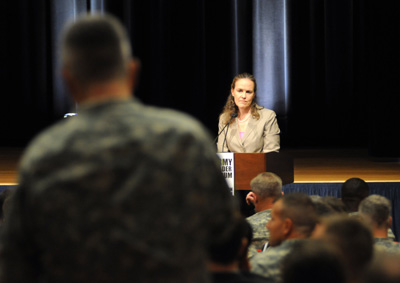DoD undersecretary: Army may be asked to prevent war
By C. Todd Lopez
WASHINGTON (May 05, 2009) -- In the new security environment, Soldiers need to develop skills that will allow them to prevent a war from happening, said one senior DoD official.
"In the future, the U.S. military is just as likely to be asked to prevent war rather than make it," said Michèle Flournoy, under secretary of Defense for Policy.

Before an audience of Soldiers and civilians attending an Army Leader Forum, May 4, at the Pentagon, Flournoy explained challenges to the United States in the new security environment, insights on strategies to deal with those new challenges, and the effects on the Army.
A weak or collapsing nation is one of the emerging security challenges faced by the United States, Flournoy said, saying that weak states can pose a threat to U.S. interests.
"Weak states increasingly struggle to meet the basic needs of their populations; and those that cannot become increasingly unstable," she said. "We see an increased potential for these states to fail or to have ungoverned spaces within them -- and these can be fertile ground for terrorists, organized crime and lawlessness."
The Army must develop Soldiers who are able to help build capacity in weak nation states, Flournoy said. This means Soldiers prepared to do more than fight war in these areas, but who are ready with skills needed to prevent war and the failure of states.
"Troops will often find themselves working alongside civilians," she said, or partnering with coalition or host nations. "Every Soldier needs to be part warfighter, part diplomat, part social engineer, and part entrepreneur. The ability to move, shoot and communicate will remain important, but so will the ability to mediate disputes, mentor local security forces and win the trust of community leaders."
The Department of Defense's director of policy said in the future, the U.S. must also do better at using elements of "soft power" before resorting to the hard-power options provided by the military.
"U.S. engagement has to be smarter, and by that I mean we must be more proactive in our use of soft power ... and more selective in the where, when and how of the use of our military might," Flournoy said.
Flournoy also said the government must work toward better inter-agency cooperation and work to build, develop and reward diplomats that are experts at applying soft power. The observation was one of the strategies Flournoy discussed to deal with the emerging security challenges faced by the United States.
"Recognize that military power is necessary, but not sufficient, to deal with many of these 21st century challenges," Flournoy said. "The U.S. will continue to need a strong military second to none -- but complex problems demand solutions that integrate all the instruments of national power.
"We need to take whole-government approaches to security issues. This will require major reform in our inter-agency process, as well as a more balanced investment in national security interests. We do need to invest more in the State Department's capacity, particularly their capacity to deploy civilians in an expeditionary manner to do critical functions abroad."
Some other challenges cited by Flournoy include an increased struggle with extremism around the world that is further aided by emerging technology.
"We now face a long global struggle against violent extremism," she said. "The emergence of al Qaeda and associated groups is perhaps the most vivid case in point. Revolutions in communications and transportation technology now enable such organizations to recruit and operate trans-nationally, challenging states in increasingly significant ways."
Proliferation of nuclear and other weapons of mass destruction also pose a problem, Flournoy said, including recent developments with both North Korea and Iran. She also said that there is increasing risk from non-state actors who are finding ways to obtain WMDs.
Finding a way to relate to China's growing dominance is another challenge in the changing security environment, Flournoy said. As China becomes more powerful, the United States must learn to work with the Chinese on issues such as the economy or the environment, while at the same time being poised to respond to whatever risks come from their increasing military power.
"We now face the challenge of simultaneously engaging and hedging against a rising China," Flournoy said, noting the rise in the country's military capability, including cyber, anti-satellite, and anti-ship capabilities.
Flournoy offered several observations on how the United States might deal with new security challenges.
"U.S. strategy must be grounded in pragmatism rather than ideology," she said. "We need a clear-eyed assessment of the challenges and the opportunities we face in the new security environment and our objectives must be realistic and derived from -- rooted in -- our core national interests."
She said the United States must be a leader and continue to be engaged in world affairs, particularly in critical regions of the world.
"Neo-isolationism is simply not an option for us," Flournoy said. "In this very connected world, events far from our borders can have enormous impacts on domestic wellbeing."
Flournoy also said the United States must be an example of adherence to international law and conduct.
"The United States must exemplify respect for the rule of law," she said. "We have to stop invoking American exceptionalism and return to a historical role as champion of the role of law both domestically and internationally. We must abide by the treaties and norms we helped put into place after World War II and we must lead efforts to adapt the international order and institutions to new realities like transnational terrorism."